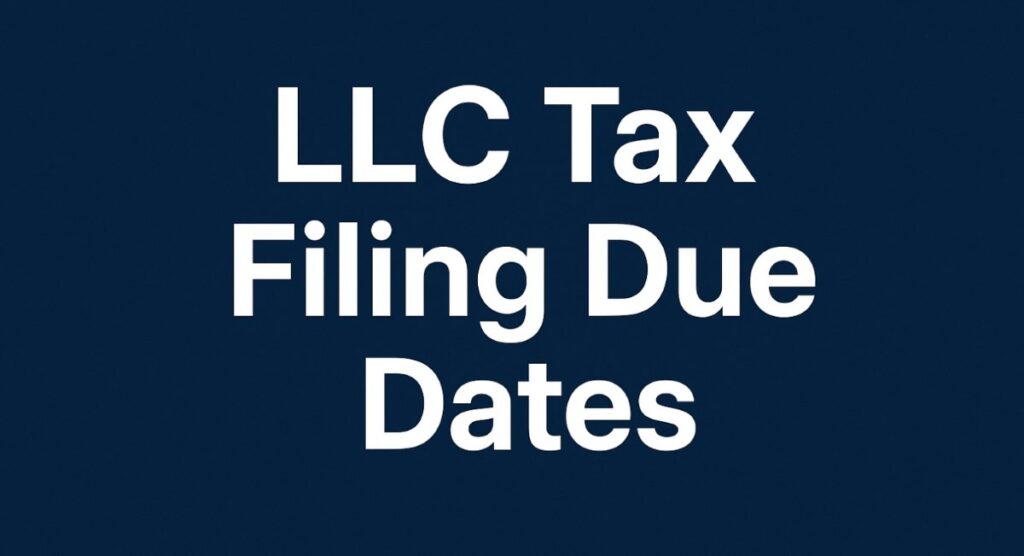Running a Limited Liability Company (LLC) in the United States comes with both flexibility and responsibility. One of the most critical responsibilities is staying on top of your LLC tax filing due dates. Missing a deadline can result in penalties, interest charges, and even jeopardize your good standing with the IRS or your state authority.

But here’s the challenge: LLC tax deadlines vary depending on how your LLC is taxed at the federal level (single-member, partnership, S corporation, or C corporation) and which state you operate in.
This guide provides a detailed overview of LLC tax filing due dates, both federally and state-specific, along with official references, practical examples, and tips to avoid costly mistakes.
1. Federal LLC Tax Filing Due Dates
The IRS doesn’t have a one-size-fits-all rule for LLCs. Instead, deadlines depend on how your LLC elects to be taxed.
A. Single-Member LLC (Disregarded Entity)
- Treated as a sole proprietorship.
- Must file Schedule C (Form 1040) with the owner’s personal tax return.
- Tax filing due date: April 15 (or the next business day if it falls on a weekend or holiday).
- Extension available: October 15 by filing Form 4868.
👉 Related reading: Can a Single-Member LLC Hire Independent Contractors?
B. Multi-Member LLC (Partnership)
- Must file Form 1065 (U.S. Return of Partnership Income).
- Tax filing due date: March 15.
- Extension available: September 15 using Form 7004.
C. LLC Electing S Corporation Status
- Must file Form 1120-S.
- Tax filing due date: March 15.
- Extension available: September 15 with Form 7004.
D. LLC Electing C Corporation Status
- Must file Form 1120.
- Tax filing due date: April 15.
- Extension available: October 15 with Form 7004.
📌 Official reference: IRS – Tax Due Dates
2. State-Specific LLC Tax Filing Due Dates
Beyond federal filings, most states impose additional LLC tax deadlines. These may include franchise taxes, annual reports, or state-level income tax returns. Below are some of the most important states for LLC owners:
California
- Annual Franchise Tax: Minimum $800.
- Form 568 due date: March 15.
- Extension until October 15 is possible.
- Source: California Franchise Tax Board
New York
- LLC Filing Fee: Applies to most LLCs.
- Due date: March 15.
- Estimated taxes may be due in April, June, September, and January.
- Source: New York State Department of Taxation and Finance
Texas
- No state income tax, but LLCs must pay a Franchise Tax.
- Due date: May 15.
- Source: Texas Comptroller
Florida
- State corporate income tax applies to LLCs taxed as corporations.
- Due date: May 1 (or the next business day).
- Source: Florida Department of Revenue
Illinois
- Must file an Annual Report with the Secretary of State.
- Due date: On or before the first day of the LLC’s anniversary month.
- Source: Illinois Secretary of State
New Jersey
- Annual Report Fee: $75.
- Due date: End of the anniversary month of formation.
- Source: NJ Division of Revenue
Massachusetts
- Requires an Annual Report filing online.
- Due date: On or before the anniversary date of formation.
- Source: Massachusetts Secretary of State
Virginia
- Requires an Annual Registration Fee.
- Due date: Last day of the month in which the LLC was formed.
- Source: Virginia State Corporation Commission
3. Common Mistakes LLC Owners Make With Tax Deadlines
- Missing federal extensions – thinking an extension to file also means an extension to pay (it doesn’t).
- Ignoring state-level requirements – each state has different forms and fees.
- Confusing LLC type – deadlines differ if your LLC is taxed as a sole proprietorship, partnership, or corporation.
- Forgetting estimated quarterly payments – required if you expect to owe more than $1,000 in taxes.
4. Tips for Staying Compliant With LLC Tax Due Dates
- Mark all LLC tax deadlines in your calendar.
- Use IRS and state tax portals for e-filing to avoid delays.
- Work with a CPA if your LLC operates in multiple states.
- File early to reduce the stress of last-minute errors.
Conclusion
Understanding when LLC tax filings are due is crucial for every business owner. At the federal level, deadlines typically fall on March 15 for partnerships and S corporations, and April 15 for single-member LLCs and C corporations. State deadlines vary widely — from March 15 in California and New York to May 15 in Texas or anniversary-based dates in Illinois, New Jersey, Massachusetts, and Virginia.
By staying proactive, making use of extensions, and keeping track of both federal and state filing requirements, you can ensure your LLC remains compliant and avoids unnecessary penalties.
📌 Official Resources